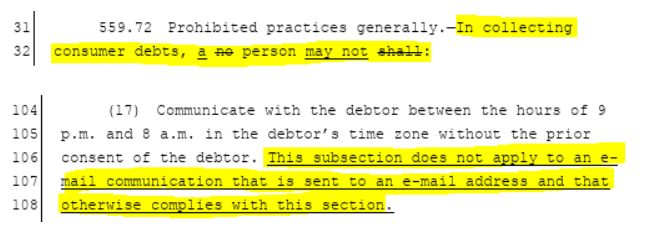On May 16, Governor Ron DeSantis signed bill CS/CS/SB 232 into law. The bill includes modifications to the Florida Consumer Collection Practices Act (FCCPA) to make clear that the prohibition on communications between "9 p.m. and 8 a.m. without prior consent of the debtor" does not include emails. The financial services plaintiffs' bar has so far had a field day suing banks, consumer finance companies, and debt collectors for allegedly violating the FCCPA by sending routine loan and account-related emails after 9 p.m.
Until last week, Section 559.72(17) stated broadly, and vaguely, that no "person" may "[c]ommunicate with [a] debtor between the hours of 9 p.m. and 8 a.m. in the debtor's time zone without the prior consent of the debtor." The Section 559.72(17) changes are set forth below:

While the statute was initially enacted with the intent of preventing disruptive late-night phone calls, class action plaintiffs have opportunistically stretched the statute's language in recent years to cover modern, asynchronous communications—particularly email. In doing so, many claimants have pressed FCCPA claims against defendants based on the mere fact that a debt collection email was sent after 9 p.m., regardless of whether the consumer was disturbed or even aware the email was sent at that time.
This amendment is more than just a win for operational clarity—it is a legislative rebuke to remove a key foothold for meritless class actions. By reinforcing the FCCPA's substantive protections while closing the door on technical "gotcha" lawsuits, Florida has taken a pragmatic step toward restoring balance in this field of the class action law and provided a roadmap for other states facing similar challenges.
The content of this article is intended to provide a general guide to the subject matter. Specialist advice should be sought about your specific circumstances.



